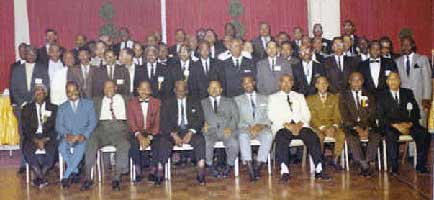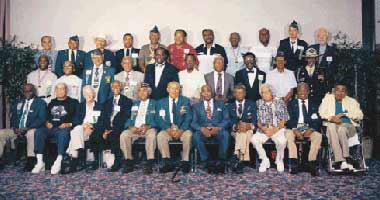
Veterans of the first black tank battalion to fight in World War II met last weekend to talk of death, not their own, but their organization's. Photo by Scott Olson for The New York Times
Some Notable Old Soldiers Fight to Avoid Fading Away
The New York Times
September 2, 2002
By Steven A. Holmes
OAKLAWN, Ill., Sept. 1 — The veterans gathered in hotel meeting rooms this weekend, several ambling in with the aid of walkers or canes, others walking on legs no longer steady or sure. They came to talk of death, not their own, but their organization's.
Since 1948, three years after they finished fighting in World War II, the survivors of the 761st Tank Battalion have met annually to renew friendships; inquire about children, grandchildren and now great-grandchildren; and swap tales about their exploits on the battlefield.
The tales of the 761st, the first black tank battalion to fight in the war, are impressive. The battalion, nicknamed the Black Panthers, endured two years of training on harshly segregated Army posts in Louisiana and Texas. In Europe, it became one of the most decorated black units in the war, fighting in the Battle of the Bulge and breaching the Siegfried Line, while suffering a 50 percent casualty rate. After the war, the battalion's men fought for recognition, finally receiving a Presidential Unit Citation in 1978 and successfully lobbying to have one of their own, Sgt. Ruben Rivers, awarded the Medal of Honor in 1997.
While racism, the Germans and indifference to its exploits could not destroy the unit, death and infirmity have thinned its ranks. This year the main business at the annual convention was to decide whether the 2002 gathering would be the last.
"To set up a meeting, to follow up to stay on top of things, to put together a program, to get sponsors, it's a lot of work for a person of their age," said Baron Bates, 68, the son of the battalion's white commander, Col. Paul Bates, who died in 1995.
At its apex in the 1950's and 1960's, the annual meeting of the 761st's association would bring together more than 400 veterans, with family members. This year, 31 attended.
It was hard for many of them to be there. Unlike better known black World War II combat units like the Tuskegee Airmen, who tended to be college graduates and middle class, the men of the 761st were largely blue-collar workers, whose retirement incomes made it hard to afford airfare, three days in a hotel, boat rides and the traditional dinner dance. Many are simply too old to make it to the meeting.
"After we've had upwards of 400, it's come down to this," Newton Long, 79, a retired Chicago firefighter and the association's president, told the men at the convention. "I want you to know that we appreciate you. We love you. We persevered together in Europe. We persevered together in America. We'll persevere in whatever comes next."
Though sadness, and even fear, hung over the meeting, it could not suppress the tankers' often-rascally humor. A perky hotel representative stuck her head into the meeting room to say hello and offer assistance. If there is anything you need, just ask, she told the men. "We need some whiskey," one man shouted. "You got some whiskey?"
Some said that maybe the gathering could be saved by down-sizing, scrapping the annual banquet and staying in cheap motels instead of expansive hotels. If that did not work, some said, not to worry about outrunning time.
"It wouldn't be such a bad idea to call it quits," Rufus Taylor, 89, of Pontiac, Mich., said. "We've had a good run. Nothing lasts forever."
While many men who fought in World War II have died, veterans' associations often spring from military units that still exist. They have a steady infusion of men — and in some cases now, women — to carry on the association's name. But because the 761st was decommissioned after the war, these few veterans are its last survivors.
Years ago the group changed its name to the 761st Tank Battalion and Allied Veterans Association and opened its ranks to any veteran who wanted to join. But the group did little outreach and attracted few veterans from other units.
"In effect, they kind of isolated themselves," said Jerome Long, 73, of Middletown, Conn., and the brother of the group's president.
There was some talk that even without the annual meeting, the 761st would carry on through its local chapters. But many members said it would not be the same if they did not get together annually, and because the convention was really the only association activity, ending it would effectively mean the group's death.
It would also mean that something would go out of the veterans' lives.
"I look forward each year to seeing you guys, Smitty, McBurney," said Floyd Dade, 78, of San Francisco, as he stood in front of the group, dabbing his moist eyes with a blue handkerchief and calling out names of his friends, "even you, Kroger, back there. Wake up!"
To save its annual convention, the group contemplated merging with another veterans' association, that of the 758/64th Armored Group. The 758th was another black tank unit that fought in the war. Unlike the 761st, the 758th was not decommissioned, and a merger would bring a fresh supply of veterans to help the 761st put together its annual convention or at least help keep down the cost.
"To keep our unit alive, I think we have to merge with all the tankers that we can find throughout the states," Willie Lee Topps, 79, of Chicago, said.
But the thought of merging evoked fears of being swallowed up and disappearing. "If we merge we have to work out some stipulations," said Leonard Smith, 79. "We don't want to lose our identity. They may want to take us over."
"If you're dead, you don't have any identity," Jerome Long replied. "I think it's best to think about the future."
In the end, the men voted to set up a committee to talk with the other association, not about a merger, but about joint annual conventions. It was the best solution they could come up with, everyone agreed. But, they also agreed, it was little more than staving off the inevitable.
"I think we're going to have a convention next year," Harold B. Gary, 79, of Charlotte, N.C. said. "But we all know that the time is coming."

These photos of previous reunions are from Harry K. Tyree 
